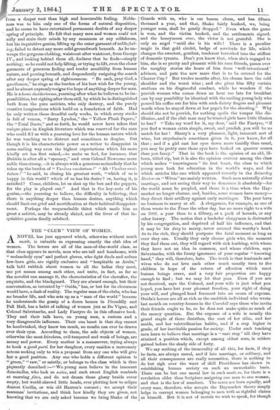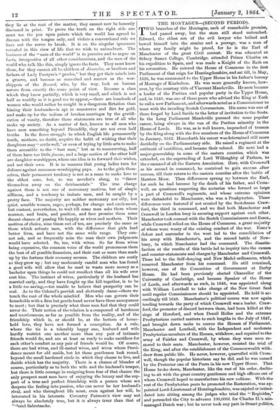THE " CLUB " VIEW OF WOMEN.
ANOVEL has just appeared which, otherwise without much merit, is valuable as expressing exactly the club idea of women. The heroes are all of the men-of-the-world class, as that class appears in novels, men who are tall and handsome, with " melancholy eyes" and perfect gloves, who fight duels and seduce low-born girls, are rigidly exclusive and " hospitable as Arabs," talk bold rubbish about women to all the ladies they meet, use pet names among each other, and unite, in fact, as far as the novelist can manage it, the characteristics of the chevalier, the exquisite, and the blackguard. They are absurd enough, but their conversation, as invented by " Ouida," has, or but for its cleverness would have, a dash of reality. The regular man of the clubs, who has no broader life, and who sets up as a "man of the world" because he understands the gossip of a dozen houses in Piccadilly and Pall Mall, has a habit of talking of women just as De Vigne, and -Colonel Sabretasche, and Lady Fantyre do in this offensive book. They and their talk have, on young men, a curious and a very disagreeable influence. Their one boast is that they cannot be hoodwinked, they know too much, no muslin can ever be drawn over their eyes. According to them, the sole objects of women, otherwise the most frivolous, evil-tempered and weak of beings, are money and power. Every mother is a manceuvrer, trying always to hook a good parti for her daughter, every maiden a mercenary actress seeking only to win a proposal from any one who will give her a good position. Any one who holds a different opinion is "green," "raw," or saintly, or belongs to the class which is thus piquantly described :—" We young men believe in the innocent demoiselles, who look so naive, and such sweet English rosebuds at morning flies, and do. not dream those glossy braids cover empty, but world-shrewd little heads, ever plotting how to eclipse dearest Cecilia, or win old Hauton's coronet ; we accept their mammas' invitations, and think how kindly they are given, not knowing that we are only asked because we bring Shako of the
Guards with us, who is our bosom chum, and has fifteen thousand a year, and that, Shako fairly hooked, we, being younger sons, shall be gently dropped." Even when the game is won, and the victim hooked, and the settlements signed, and the honeymoon over, the victor is not grateful. She is only an angel "until she is his wife I There is a peculiar magic in that gold circlet, badge of servitude for life, which changes the sweetest, gentlest, tenderest betrothed into the stiffest of domestic tyrants. Don't you know that, when she's engaged to him, she is so pretty and pleasant with his men friends, passes over the naughty stories she hears of him from ' well-intentioned' advisers, and pats the new mare that is to be entered for the Chester Cup ? But twelve months after, his chums have the cold shoulder and the worst wine ; and she gives him fifty curtain orations on his disgraceful conduct, while he wonders if the peevish woman who comes down an hour too late for breakfast can by any possibility be identical with the smiling young lady who poured his coffee out for him with such dainty fingers and pleasant words when he stayed down at her papa's for the shooting." Why should she not be peevish, for nothing spoils the temper like dis- illusion, and if the club man may be trusted girls have little illusion to lose ? " Take my word for it, my dear," said the Fantyre, " if you find a woman extra simple, sweet, and prudish, you will be no match for her ! Sherry's a very pleasant, light, innocent sort of wine, but strychnine's sometimes given in it, you know, for all that ; and if a girl cast her eyes down more timidly than usual, you may be pretty sure those eyes have looked on queerer scenes than you fancy." That in the book is the opinion of an old, ill- born, titled rip, but it is also the opinion current among the class which makes " knowingness " its first boast, the class to which young men look for education in the world's ways, and for which articles like one which appeared recently in the Saturday Review on " Wives" are mainly written. Such men naturally abhor marriage, and not seeing their way to denounce it absolutely—for the world musk be peopled, and there is a time when the Hay- market no longer charms, and, besides, some women have money— they direct their artillery against early marriages. The poor have no business to marry at all. A clergyman, for example, as one of them wrote to the Times the other day, has no more right to a wife on 3001. a year than to a tilbury, or a pack of hounds, or any other luxury. The notion that a bachelor clergyman is distrusted by his congregation, and deprived of half his influence, and that it may be his duty to marry, never entered this worthy's head. As to the rich, they should postpone the fatal moment as long as ever they can. Usually they only choose girls who, the moment they find them out, they will regard with sick loathing, with whom they have not an idea in common, and whose children, says Sabretasche, with the funny ignorance of your regular "knowing hand," they will, therefore, hate. The truth is that husbands aad wives who do not love each other much usually turn to the children in hope of the return of affection which most human beings crave, and a very fair proportion are happy enough to End ; but we may let that pass. Even if you are not deceived, says the Colonel, and your wife is just what you hoped, you have lost your pleasant freedom, your right of doing your will, and plunged head foremost into an ocean of expense. Ouida's heroes are all as rich as the snobbish individual who wrote last month on country-houses in the Cornhill says those who invite their friends ought to be, so he does not make quite so much of the money question. But the expense of a wife is usually the grand staple of these diatribes, the cost of her silks, and her maids, and her valetudinarian habits, and if a step higher in grade, of her inevitable passion for society. Under such teaching men learn to believe that marriage is a " rash step " till they have attained a position which, except among eldest sons, is seldom gained before the shady side of forty.
We say nothing of the immorality of all this, for facts, if they be facts, are always moral, and if late marriage, or celibacy, and all their consequences are really necessities, there is nothing to do but sigh over the want of skill Providence has shown in establishing human society on such an unworkable basis. There can be but one moral law in such matters, for there is a revelation older than Scripture assigning one man to one woman, and that is the law of numbers. The sexes are born equally, and every man, therefore, who accepts the Haymarket theory simply helps to corrupt women belonging to men with as rightful chums as himself. But it is not of morals we wish to speak, for though

















































 Previous page
Previous page